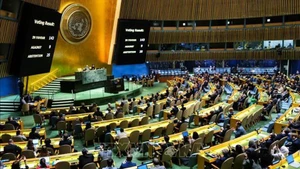Once again, nature has sounded the alarm that the consequences of climate change are getting worse and will be a big threat in the long term without timely action.
France, Spain and some other European countries have experienced the hottest June with unusually intense heat and record-high temperatures. Temperatures in many parts of France have been exceeding 40 degrees Celsius. Meanwhile, the new temperature record across Germany recorded between June 11 and June 21 was 39.2 degrees Celsius. In Italy, a hot and dry heat wave occurred in the regions of Lombardy and Piedmont, causing power outages. According to Italian officials, the drought threatens to reduce the country's agricultural output by more than 30 percent and cause estimated damages of over 2 billion EUR.
The situation is even more dire in Spain as it has recorded the worst wildfire in its history. The wildfire in the Spanish province of Zamora burned 30,800 hectares of woodland. The EU bloc had to put 12 firefighting planes and a helicopter on standby to assist countries.
No country, whether rich or poor, is immune from the severe impacts of climate change. According to the World Meteorological Organisation (WMO), among the 2 million deaths due to various types of extreme weather from 1970 to 2019, nearly 10 percent were caused by rising temperatures. Meanwhile, the European Environment Agency (EEA) noted that heatwaves in this continent were responsible for 90 percent of climate-related deaths during the 1980-2022 period.
Many initiatives have been promoted to reduce the impact of extreme weather on health including building more fountains in the city, changing the construction materials of buildings, and making use of balconies and walls to install gardens under the trend of urban farming. However, one of the optimal and sustainable solutions to protect people is to drastically cut greenhouse gas emissions and prevent climate change.
There are only five months to go until the 27th Conference of the Parties to the UN United Nations Framework Convention on Climate Change (UNFCC COP27) in Sharm El Sheikh, Egypt. Although the United Nations hoped that COP27 would see "turning points" on climate change response, reality shows that this prospect is far away.
At the recent mid-year UN climate change meeting in the German city of Bonn, negotiators made no substantive progress on controlling global warming, especially on establishing a financial base to deal with extreme weather losses. As a result, Executive Secretary of the UNFCC Patricia Espinosa called on the countries to make "major political decisions" on finance at COP27.
The current tense situation in Ukraine has also created extra hurdle regarding climate change as some countries are now planning to use more coal to replace gas supplies from Russia.
UN Deputy Secretary-General Amina J. Mohammed warned that humans are putting themselves in a "spiral of destruction". The UN urged the enhancement of cooperation for a green planet, whereby all governments, businesses and citizens must uphold the sense of responsibility, act more strongly and drastically, and implement the climate solutions in an equitable manner.
















